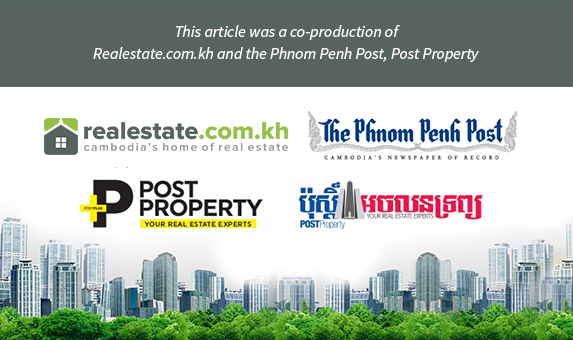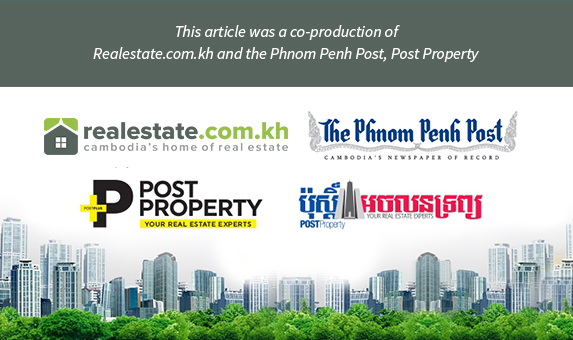In a profession that has long seen unlicensed real estate agents from tuk tuk drivers to open Facebook groups saturating the profession, local universities and real estate agencies are clamoring to attract and groom the next generation of agents. With fees ranging from $250 to $1000, these classes aim to teach the in and outs of the profession through business courses and lengthy intensive seminars. However, some students find that they need a more thorough education before committing to the profession.
In Sitha, vice president and senior valuer of World Trust Estate teaches courses at both the Cambodian Valuers and Estate Agents Association (CVEA) and Western University.
 At Western University’s three-credit 48-hour course, he focuses on basic knowledge of the market and industry trends to provide a general overview.
At Western University’s three-credit 48-hour course, he focuses on basic knowledge of the market and industry trends to provide a general overview.
“The students will have a better understanding of the real estate market in the area; why there are many companies investing on this sector, and why there are many investors investing in this country,” said Sitha. “Real estate is an important subject globally. That’s why countries like Malaysia and Singapore teach [these] subjects.”
Out of all the lessons that the students can take away, Sitha reminds them time and time again of the importance of ethics to steer agents away from becoming entangled within legal predicaments, something that is rising as often unchecked investor cash flows in from overseas.
“The most crucial duty of a real estate agent is to legitimise developments and investment,” he said, adding that to do so, an agent has to verify if the developer is properly licensed and has obtained permits from the authorities.
Another thing he stresses is that agents need to do their homework and investigate a developer’s international and local track record, because “measuring a client’s financial status is a very important thing to be sure of,” something that can be difficult for smaller projects or new entrants into the scene.
Meanwhile, at CVEA the classes are geared towards career development and valuation. The students range from company managers, to government officials and bankers who wish to increase their knowledge in a fast growing market. His class is usually full of students, he said. Taught one day a week at a cost of $200 to $250, once completed, students receive CVEA certification.
Century 21 Cambodia, an international franchise, is another company offering classes for current and prospective agents. Learning Director, Grace Rachny Fong, said that their best selling and well-known course is “How to be a professional real estate agent” at $295 for a full day intensive.
Other workshops last for three days at a total of 36 hours. Once completed, participants receive certification that is recognised in all 75 countries in which Century 21 operates.
Century 21 also offers 16-day, seven course packages to the tune of $990. The majority of the students, Fong said, vary from college graduates, company managers, doctors and dentists, as wells as current investors.
Se Penglong, a business major at Western University and one of Sitha’s many students, said that real estate classes have provided an insight into the sector and the terms, conditions and responsibilities involved in a real estate deal; something which he sees as beneficial as the sector grows.
“We can see rapid growth in infrastructure and construction,” he said. “At the same time, we can also see an increase in foreign and local investment.”
Meanwhile, Ry Socheat, also a business major, said that although he has learned a lot, he doesn’t yet have the confidence to delve into the world of real estate.
“While the course has been valuable, the lessons only cover a small part of a complex sector,” he said.
Kong Sovanatey, who is pursuing a degree in hotel management, explained that while she now has a grasp of the fundamentals, when it comes to purchasing or looking for property, she would still prefer to seek out a professional real estate agent.
Um Vuthdara, a professor of Economics at Pannasastra University of Cambodia, said that the real estate courses through both universities and agencies are a good start because “we should have developed these skills many, many years ago”.
While the construction sector has taken centre stage, becoming one of the major contributors towards GDP growth, he explained that no country can develop “without good human capital”.
With 13 years of experience as a professor, he said that to support real estate development, “education and training needs to also include direct practical work,” noting that while it is up to a university or agency to provide quality programs, a course just provides a general guideline.
It is up to the “students to practice their work with the private sector and investors,” he said, adding that is when the value of a real estate course really comes into play.
Catherine Harry and Moeun Nhean, Phnom Penh Post, Post Property.

 At Western University’s three-credit 48-hour course, he focuses on basic knowledge of the market and industry trends to provide a general overview.
“The students will have a better understanding of the real estate market in the area; why there are many companies investing on this sector, and why there are many investors investing in this country,” said Sitha. “Real estate is an important subject globally. That’s why countries like Malaysia and Singapore teach [these] subjects.”
Out of all the lessons that the students can take away, Sitha reminds them time and time again of the importance of ethics to steer agents away from becoming entangled within legal predicaments, something that is rising as often unchecked investor cash flows in from overseas.
“The most crucial duty of a real estate agent is to legitimise developments and investment,” he said, adding that to do so, an agent has to verify if the developer is properly licensed and has obtained permits from the authorities.
Another thing he stresses is that agents need to do their homework and investigate a developer’s international and local track record, because “measuring a client’s financial status is a very important thing to be sure of,” something that can be difficult for smaller projects or new entrants into the scene.
Meanwhile, at CVEA the classes are geared towards career development and valuation. The students range from company managers, to government officials and bankers who wish to increase their knowledge in a fast growing market. His class is usually full of students, he said. Taught one day a week at a cost of $200 to $250, once completed, students receive CVEA certification.
Century 21 Cambodia, an international franchise, is another company offering classes for current and prospective agents. Learning Director, Grace Rachny Fong, said that their best selling and well-known course is “How to be a professional real estate agent” at $295 for a full day intensive.
Other workshops last for three days at a total of 36 hours. Once completed, participants receive certification that is recognised in all 75 countries in which Century 21 operates.
Century 21 also offers 16-day, seven course packages to the tune of $990. The majority of the students, Fong said, vary from college graduates, company managers, doctors and dentists, as wells as current investors.
Se Penglong, a business major at Western University and one of Sitha’s many students, said that real estate classes have provided an insight into the sector and the terms, conditions and responsibilities involved in a real estate deal; something which he sees as beneficial as the sector grows.
“We can see rapid growth in infrastructure and construction,” he said. “At the same time, we can also see an increase in foreign and local investment.”
Meanwhile, Ry Socheat, also a business major, said that although he has learned a lot, he doesn’t yet have the confidence to delve into the world of real estate.
“While the course has been valuable, the lessons only cover a small part of a complex sector,” he said.
Kong Sovanatey, who is pursuing a degree in hotel management, explained that while she now has a grasp of the fundamentals, when it comes to purchasing or looking for property, she would still prefer to seek out a professional real estate agent.
Um Vuthdara, a professor of Economics at Pannasastra University of Cambodia, said that the real estate courses through both universities and agencies are a good start because “we should have developed these skills many, many years ago”.
While the construction sector has taken centre stage, becoming one of the major contributors towards GDP growth, he explained that no country can develop “without good human capital”.
With 13 years of experience as a professor, he said that to support real estate development, “education and training needs to also include direct practical work,” noting that while it is up to a university or agency to provide quality programs, a course just provides a general guideline.
It is up to the “students to practice their work with the private sector and investors,” he said, adding that is when the value of a real estate course really comes into play.
Catherine Harry and Moeun Nhean, Phnom Penh Post, Post Property.
At Western University’s three-credit 48-hour course, he focuses on basic knowledge of the market and industry trends to provide a general overview.
“The students will have a better understanding of the real estate market in the area; why there are many companies investing on this sector, and why there are many investors investing in this country,” said Sitha. “Real estate is an important subject globally. That’s why countries like Malaysia and Singapore teach [these] subjects.”
Out of all the lessons that the students can take away, Sitha reminds them time and time again of the importance of ethics to steer agents away from becoming entangled within legal predicaments, something that is rising as often unchecked investor cash flows in from overseas.
“The most crucial duty of a real estate agent is to legitimise developments and investment,” he said, adding that to do so, an agent has to verify if the developer is properly licensed and has obtained permits from the authorities.
Another thing he stresses is that agents need to do their homework and investigate a developer’s international and local track record, because “measuring a client’s financial status is a very important thing to be sure of,” something that can be difficult for smaller projects or new entrants into the scene.
Meanwhile, at CVEA the classes are geared towards career development and valuation. The students range from company managers, to government officials and bankers who wish to increase their knowledge in a fast growing market. His class is usually full of students, he said. Taught one day a week at a cost of $200 to $250, once completed, students receive CVEA certification.
Century 21 Cambodia, an international franchise, is another company offering classes for current and prospective agents. Learning Director, Grace Rachny Fong, said that their best selling and well-known course is “How to be a professional real estate agent” at $295 for a full day intensive.
Other workshops last for three days at a total of 36 hours. Once completed, participants receive certification that is recognised in all 75 countries in which Century 21 operates.
Century 21 also offers 16-day, seven course packages to the tune of $990. The majority of the students, Fong said, vary from college graduates, company managers, doctors and dentists, as wells as current investors.
Se Penglong, a business major at Western University and one of Sitha’s many students, said that real estate classes have provided an insight into the sector and the terms, conditions and responsibilities involved in a real estate deal; something which he sees as beneficial as the sector grows.
“We can see rapid growth in infrastructure and construction,” he said. “At the same time, we can also see an increase in foreign and local investment.”
Meanwhile, Ry Socheat, also a business major, said that although he has learned a lot, he doesn’t yet have the confidence to delve into the world of real estate.
“While the course has been valuable, the lessons only cover a small part of a complex sector,” he said.
Kong Sovanatey, who is pursuing a degree in hotel management, explained that while she now has a grasp of the fundamentals, when it comes to purchasing or looking for property, she would still prefer to seek out a professional real estate agent.
Um Vuthdara, a professor of Economics at Pannasastra University of Cambodia, said that the real estate courses through both universities and agencies are a good start because “we should have developed these skills many, many years ago”.
While the construction sector has taken centre stage, becoming one of the major contributors towards GDP growth, he explained that no country can develop “without good human capital”.
With 13 years of experience as a professor, he said that to support real estate development, “education and training needs to also include direct practical work,” noting that while it is up to a university or agency to provide quality programs, a course just provides a general guideline.
It is up to the “students to practice their work with the private sector and investors,” he said, adding that is when the value of a real estate course really comes into play.
Catherine Harry and Moeun Nhean, Phnom Penh Post, Post Property.





Comments